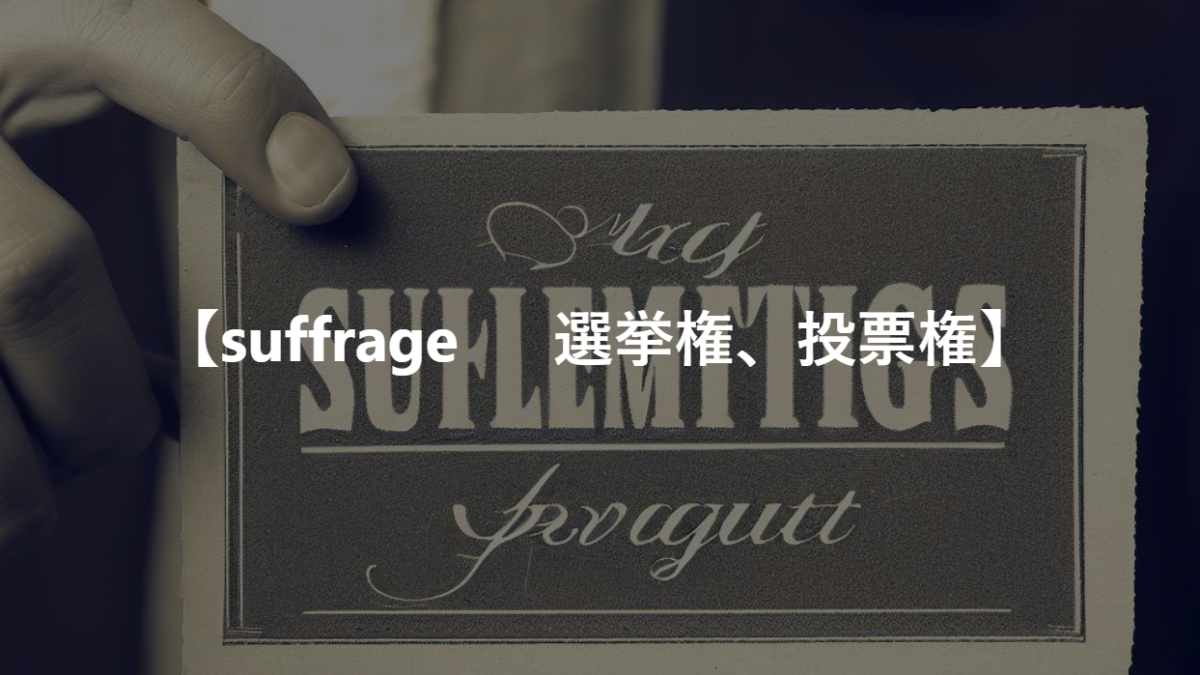【suffrage 選挙権、投票権】という単語の語源とか由来を知っていますか?
「suffrage」という単語は、ラテン語の「suffragium」から来ています。この言葉は元々、「投票」「支持の表明」または「祈り、支援の願い」という意味を持っていました。中世ラテン語を経て、英語に取り入れられた際には、主に「投票権」や「選挙権」という意味で使われるようになりました。
「suffragium」は、古代ローマの市民が公的な決定に参加する際の投票行為を指す言葉として使用されていました。時が経つにつれ、この言葉は民主的な権利や義務、特に選挙における市民の権利を指すために進化しました。そのため、「suffrage」は民主主義の重要な概念の一つとして、特に19世紀から20世紀にかけての女性の選挙権や普通選挙権の拡大といった歴史的な文脈で頻繁に使用されています。
The word “suffrage” originates from the Latin “suffragium,” which initially meant “voting,” “expression of support,” or “a prayer or wish for support.” Through Medieval Latin, it was adopted into English, predominantly used to denote “the right to vote” or “electoral franchise.”
“Suffragium” was employed in ancient Rome to describe the act of voting by citizens participating in public decision-making. Over time, this term evolved to represent a democratic right and duty, specifically referring to the civic right in elections. Consequently, “suffrage” has become a crucial concept in democracy, especially in the historical context of expanding voting rights to women and the universal suffrage movement during the 19th and 20th centuries.
この単語の類義語・反対語を教えてください。
類義語
- Voting rights: 投票する権利。”Suffrage”と同様に、選挙に参加する権利を意味します。
- Electoral franchise: 選挙権。選挙で投票できる資格や権利を指します。
- Enfranchisement: 権利授与。特に投票権を与える行為や状態を指します。
- Ballot rights: 投票権。”Ballot”は投票用紙を意味し、この表現も投票する権利を指します。
- Vote: 投票。より一般的な用語で、投票行為自体やその権利を指します。
反対語
- Disenfranchisement: 権利剥奪。投票権などの市民権を奪うことを指します。
- Voter suppression: 投票抑制。特定のグループの投票を意図的に妨げる行為を指します。
- Disqualification: 資格剥奪。投票の資格を失うことを意味します。
この単語に似た単語で間違いやすい単語はありますか?
- Sufferage: 発音が似ていますが、全く異なる意味を持ちます。「Sufferage」は苦痛や苦しみを意味する古い英語で、現代英語ではほとんど使われません。「Suffrage」が選挙権を意味するのに対し、「Sufferage」は苦しみや悲しみに関連する表現です。
- Franchise: 「Franchise」は選挙権や投票権を意味することもありますが、ビジネスの分野では特定のビジネスモデルやブランドの権利を指すことが一般的です。「Suffrage」と「Franchise」は、コンテキストによって意味が大きく変わるため、使用する際には注意が必要です。
- Suffragist vs. Suffragette: これらは「suffrage」に直接関連する単語で、どちらも選挙権拡大を目指す活動家を指しますが、特に「Suffragette」はイギリスで女性の選挙権を求める運動の活動家に使われた言葉です。時にはこれらの用語が混同されがちですが、歴史的背景や活動の文脈において異なるニュアンスを持ちます。
この単語を使った例文を5つほど教えてください。
Universal suffrage allows all citizens, regardless of their background, to exercise their right to vote.
(普遍的な選挙権は、出身背景に関係なくすべての市民が投票権を行使できるようにします。)
The suffrage movement in the early 20th century fought for women’s right to vote.
(20世紀初頭の参政権運動は、女性の投票権を求めて戦いました。)
The country recently extended suffrage to citizens aged 16 and above.
(最近、その国では16歳以上の市民にも選挙権が拡大されました。)
Many activists and leaders dedicated their lives to the suffrage cause, advocating for equal voting rights.
(多くの活動家や指導者が、平等な投票権を求めるために自らの人生をささげました。)
The suffrage movement achieved a major milestone when the right to vote was granted to marginalized communities.
(参政権運動は、弱者のコミュニティに投票権が与えられた際に重要な節目を迎えました。)
【suffrage 選挙権、投票権】のコロケーション
- universal suffrage(普通選挙権): 成人男性だけでなく、すべての成人に選挙権を与えることを意味します。この用語は、性別や財産に関係なく成人市民に投票権を保証する概念を指します。
- women’s suffrage(女性の選挙権): 女性に投票権を与える運動やその権利自体を指します。19世紀末から20世紀初頭にかけて、多くの国で女性の選挙権を求める運動が活発に行われました。
- extend suffrage(選挙権を拡大する): 特定のグループに選挙権を新たに与える行為を指します。例えば、若年者や外国人居住者に投票権を拡大することが含まれます。
- denied suffrage(選挙権を否定される): 投票権が制限されたり、特定のグループから剥奪されたりする状況を指します。歴史的に、人種、性別、社会的地位に基づいて選挙権が否定されることがありました。
- fight for suffrage(選挙権を求めて戦う): 投票権を獲得するための運動や活動を指します。多くの場合、政治的、社会的な変化を求める運動の一環として行われます。
「suffrage」という言葉は、選挙権や投票権という概念を通じて、民主主義の核心に触れます。この言葉が使われるさまざまなコロケーションは、歴史を通じて、そして今日においても、人々がどのようにして自らの権利を追求し、社会に変革をもたらそうとしてきたかを示しています。
「universal suffrage」、つまり普通選挙権は、すべての成人市民に平等に投票権を与えるという理念を表しています。この概念は、性別や財産に基づく差別を排除し、全ての人々の声が政治的決定に反映されるべきだという信念に基づいています。
「women’s suffrage」は、女性に投票権を認める運動を指し、この運動は多くの国で社会的、政治的な変革の象徴となりました。女性が選挙権を獲得することは、性別に基づく不平等に挑戦し、より公正な社会を目指す歴史的なステップでした。
「extend suffrage」は、選挙権を新たなグループに拡大することを意味し、民主主義の範囲を広げる努力を示しています。一方、「denied suffrage」は、選挙権が否定され、制限された状況を指し、これらの状況を克服するための闘争が歴史を通じて続いてきました。
そして、「fight for suffrage」は、投票権を求めて戦う運動を指し、政治的、社会的な変化を求める人々の努力を象徴しています。これらの運動は、しばしば大きな困難に直面しながらも、人々が自らの権利を主張し、社会の進歩を促進する力となっています。
これらのコロケーションを通じて、選挙権や投票権がいかに重要な概念であるか、そして民主主義の進化におけるその役割を深く理解することができます。それは、個人が社会において自らの意志を表明し、その過程で世界を形作っていく権利の表現です。
The term “suffrage” touches upon the core of democracy through the concepts of voting rights and electoral franchise. The various collocations in which this word is used demonstrate how people have pursued their rights and sought to bring about societal change, both historically and in the present day.
“Universal suffrage” embodies the principle of granting equal voting rights to all adult citizens, irrespective of gender or wealth. This concept is founded on the belief that every person’s voice should be reflected in political decisions, eliminating discrimination based on gender or financial status.
“Women’s suffrage” refers to the movement for granting voting rights to women, symbolizing social and political transformation in many countries. The achievement of voting rights for women represented a historical step toward challenging gender-based inequalities and striving for a more equitable society.
“Extend suffrage” signifies the efforts to broaden the scope of democracy by extending voting rights to new groups, while “denied suffrage” points to situations where electoral rights are negated or restricted, highlighting the ongoing struggles to overcome these barriers.
Lastly, “fight for suffrage” symbolizes the movements fighting for the right to vote, epitomizing the efforts of individuals seeking political and social changes. These movements often faced significant challenges yet represented a powerful force for asserting individual rights and advancing societal progress.
Through these collocations, we can deeply appreciate the significance of voting and electoral rights as key concepts, and their role in the evolution of democracy. They represent the right of individuals to express their will within society and, in doing so, shape the world.
suffrageを使った文法問題
- The women’s _____ movement fought for the right of women to vote in elections.
- (A) suffragist
- (B) suffrage
- (C) suffragette
- (D) suffuse
解答と解説: (B) suffrage
解説: women’s suffrage movementで「女性参政権運動」という意味になります。suffragistは「参政権拡張論者」、suffragetteは「女性参政権論者」、suffuseは「覆う、染める」という意味で、文意に合いません。
- In many countries, _____ is considered a fundamental human right.
- (A) suffragist
- (B) suffrage
- (C) suffragette
- (D) suffuse
解答と解説: (B) suffrage
解説: 文脈から、多くの国で「選挙権」が基本的人権と考えられていることがわかります。
- The 19th Amendment to the U.S. Constitution granted women the right to _____.
- (A) suffragist
- (B) suffrage
- (C) suffragette
- (D) suffuse
解答と解説: (B) suffrage
解説: right to suffrage で「参政権」という意味になります。
- The _____ movement achieved a major victory in 1920 when women were finally granted the right to vote in the United States.
- (A) suffragist
- (B) suffrage
- (C) suffragette
- (D) suffuse
解答と解説: (A) suffragist または (C) suffragette
解説: suffragistとsuffragetteはどちらも「参政権論者」という意味です。suffragistは男女問わず使われますが、suffragetteは特に女性参政権論者を指すことが多いです。
- The country’s _____ laws were discriminatory, denying voting rights to certain groups based on race and gender.
- (A) suffragist
- (B) suffrage
- (C) suffragette
- (D) suffuse
解答と解説: (B) suffrage
解説: suffrage laws で「選挙法」という意味になります。

